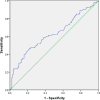The correlation between serum uric acid and diabetic kidney disease in type 1 diabetes patients in Anhui, China
- PMID: 37612612
- PMCID: PMC10463645
- DOI: 10.1186/s12882-023-03302-2
The correlation between serum uric acid and diabetic kidney disease in type 1 diabetes patients in Anhui, China
Abstract
Background/aim: To assess the correlation between serum uric acid (UA) level and diabetic kidney disease (DKD) in Type 1 diabetes (T1DM) patients in Anhui, China.
Methods: A total of 231 patients diagnosed with T1DM in our hospital were enrolled between January 2014 and December 2016. Urinary albumin-creatinine ratio (ACR) in patients with hyperuricemia was compared with those without hyperuricemia. The relationship between serum UA level and urinary ACR was examined by Spearman's correlational analysis and multiple stepwise regression analysis. The binary logistic multivariate regression analysis was performed to analyze the correlated factors for type 1 DKD.
Results: The average serum UA levels were 257.7 [215.0, 338.0]μmol/L. The median levels of urinary ACR were significantly higher in patients with hyperuricemia than those without hyperuricemia. In multiple stepwise regression analysis, Serum UA levels were positively correlated with the urinary ACR. The logistic multivariate regression analysis showed that hyperuricemia (OR: 5.24, 95% CI: 1.40-19.65, P = 0.014) had an independent positive correlation with DKD in T1DM patients, and the odds of Serum UA to DKD were both elevated as the serum UA levels rose no matter whether adjustment for traditional confounders. The area under the receiver operating characteristic curve was 0.62 (95% CI: 0.55-0.70) in assessing the discrimination of the serum UA level for DKD in T1DM patients.
Conclusions: In Chinese patients with T1DM, the serum UA level is positively correlated with urinary ACR and DKD. The correlation between Serum UA and DKD gradually increases with serum UA levels. Serum UA level is not a good predictor for DKD in T1DM patients. Serum UA may directly contribute to initiating DKD, while it has little direct but an indirect effect on an already established DKD in T1DM patients.
Keywords: Diabetic kidney disease; Serum uric acid; Type 1 diabetes mellitus.
© 2023. BioMed Central Ltd., part of Springer Nature.
Conflict of interest statement
The authors declare no competing interests.
Figures
Similar articles
-
The correlation between serum uric acid and diabetic kidney disease in adult-onset type 1 diabetes patients in China.Acta Diabetol. 2023 Sep;60(9):1231-1239. doi: 10.1007/s00592-023-02119-7. Epub 2023 Jun 1. Acta Diabetol. 2023. PMID: 37264251 Free PMC article.
-
The relationship between haemoglobin level and type 1 diabetic nephropathy in Han patients in Anhui, China.Intern Med J. 2018 Jul;48(7):830-835. doi: 10.1111/imj.13767. Intern Med J. 2018. PMID: 29460412
-
Association between decreased thyroid stimulating hormone and hyperuricemia in type 2 diabetic patients with early-stage diabetic kidney disease.BMC Endocr Disord. 2021 Jan 6;21(1):1. doi: 10.1186/s12902-020-00672-8. BMC Endocr Disord. 2021. PMID: 33407357 Free PMC article.
-
Uric Acid is independently associated with diabetic kidney disease: a cross-sectional study in a Chinese population.PLoS One. 2015 Jun 1;10(6):e0129797. doi: 10.1371/journal.pone.0129797. eCollection 2015. PLoS One. 2015. PMID: 26029914 Free PMC article.
-
Uric acid in diabetic microvascular complications: Mechanisms and therapy.J Diabetes Complications. 2025 Feb;39(2):108929. doi: 10.1016/j.jdiacomp.2024.108929. Epub 2024 Dec 5. J Diabetes Complications. 2025. PMID: 39689504 Review.
Cited by
-
Causal insights into major risk factors for diabetic kidney disease: a comprehensive meta-analysis and Mendelian randomization study.Ren Fail. 2025 Dec;47(1):2468741. doi: 10.1080/0886022X.2025.2468741. Epub 2025 Feb 26. Ren Fail. 2025. PMID: 40012233 Free PMC article.
-
Uncovering the Potential Mechanisms and Effects of Hyperuricemia and its Associated Diseases on Male Reproduction.Reprod Sci. 2024 Aug;31(8):2184-2198. doi: 10.1007/s43032-024-01453-7. Epub 2024 Feb 20. Reprod Sci. 2024. PMID: 38379071 Review.
References
MeSH terms
Substances
LinkOut - more resources
Full Text Sources
Medical


